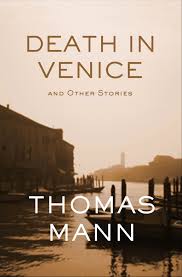Book Review
Lonely in Venice
To say that Gustav von Aschenbach had a good summer in Venice would be a lie. The weather was hot and oppressive. He repeatedly wanted to leave, but could not. A pandemic was spreading, but the authorities were trying to cover it up. He discovered his forbidden love for a boy staying in the same hotel. And then he died.
No, Thomas Mann's Death in Venice is not the prototype of a light holiday read. But is it worth opening one of the most celebrated novellas of the last century? It can be exhausting to wade through Mann's dense prose, which uses every possible excuse to leave the plot for reflections on philosophy or art, and to follow the story of the elderly professor (a thinly disguised Mann, like so many of his protagonists) who cannot take his eyes off the Polish boy Tadzio.
If you found that last sentence to be a little convoluted, perhaps don’t open the Death in Venice (I recommend simpler Mann reading at the end). Also, the core of the story, an obsessive, forbidden love, may speak less to people in Europe today. Gay love no longer has the aura of social scandal that it did in 1912 (although love with a minor does).
More relevant, I think, is another leitmotif of the novel: Loneliness. Von Aschenbach is very lonely. All the time. He talks to himself. He sits alone at breakfast. He sits alone on the beach. He eats by himself. He reads books and newspapers. He daydreams and dreams at night about Tadzio.
His only conversations are brief exchanges with hotel receptionists, postmen, shipping agents. They are all about logistics. Last year Gallup reported that almost one in four people worldwide feel lonely or fairly lonely.
And this is more about Tadzio than von Aschenbach - young people seem to be the most affected. One suspects that the measures to combat Covid have something to do with this. The World Health Organization warns of the health risks of loneliness and social isolation.
One should of course not reduce loneliness to a problem. It can also be exhilarating, as Mann writes in the novella: “The observations and encounters of a solitary, taciturn man are vaguer and at the same times more intense than those of a sociable man; his thoughts are deeper, odder and never without a touch of sadness. Images and perceptions that could be dismissed with a glance, a laugh, an exchange of opinions, occupy him unduly, become more intense in the silence, become significant, become an experience, an adventure, an emotion. Solitude produces originality, bold and astonishing beauty, poetry. But solitude also produces perverseness, the disproportionate, the absurd and the forbidden.”

That’s the message I want to share with you this holiday season. Don't be afraid to be on your own, to travel solo, to look at the world in silence. It’s often what we need to figure out where we stand. But we shouldn’t ignore the other side and also use the holidays to connect and reconnect. How do you find the right balance between the two? I’m not sure. Everyone must find out for themselves.
And if you want to be alone and read books, I conclude with some tips on Thomas Mann. Reading Death in Venice is no pleasure because its style mirrors its substance. Its tone is as obsessive as von Aschenbach is obsessive. Instead, I recommend the (much longer) Magic Mountain. It has many connections to the Venice novella, but here people talk to each other.
They discuss political philosophies in great detail. We live in a time where liberalism and human rights are under attack from many sides. These attacks are often cheap and merely hide the self-interests of authoritarian politicians. But not always. Read The Magic Mountain to gain a deeper understanding of extremist political ideologies (and you get a love story, an astonishing chapter on getting lost in a snowstorm and a lot of irony on top).
If you like it short, I recommend Mario and the Magician. This novella is about the ascent of Italian fascism and the fascination with authoritarian leaders. Yes, that’s topical as well.
Or, if you like it lighter: Disorder and Early Sorrow, a lovely novella with a fine description of a child’s emotions, set in the context of the chaos engulfing the household of a respectable professor in Germany’s hyper-inflation of 1923.
I end with the most obvious Thomas Mann tip. The novel earned him the Nobel Prize for literature. He finished at the age of twenty-five. The renowned publisher Samuel Fischer refused the manuscript. Too long, too long-wound, he complained. Could Mann reduce it by half? The largely unpublished Mann replied that the 1,100 pages were worth it. He would not delete a sentence. Fischer relented and the rest is history.
The Buddenbrooks is the most accessible of Mann’s novels. Philosophical thoughts are baked into the story line, rather than presented as long diversions. The book has colour and life and Mann’s characteristic irony is at full display. It is an excellent read and it will not make you feel lonely.
Disclaimer
The views expressed in this opinion piece are the author’s, not those of EUobserverAuthor Bio
Michael Meyer-Resende is the executive director of Democracy Reporting International, a non-partisan NGO in Berlin that supports political participation.